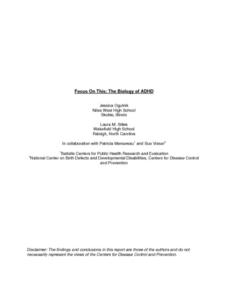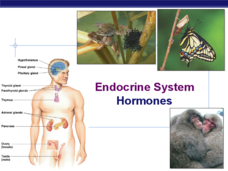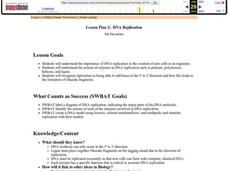Curated OER
The Sponges
In this sponge worksheet, students read about the different parts of a sponge and answer 20 short answer questions that follow. They color and label different sponge drawing.
Curated OER
Flower Power
Students explore the parts of flowers and how they reproduce. They dissect flowers and observe the reproductive organs. Students observe anthers and ovaries of Tiger Lilies under a microscope. They investigate how insects and other...
Curated OER
Your Brain At Work
In this brain worksheet, learners describe three jobs of the brain, draw a picture of a neuron and label its parts, and determine what to do to keep the brain healthy. This worksheet has 1 drawing and 2 short answer questions.
Curated OER
The Circulatory System
In this circulatory system worksheet, students review the functions of red blood cells, white blood cells, and platelets. Students label the parts of a human heart on a diagram. This worksheet has 4 short answer, 13 matching, and 9 true...
Curated OER
Out of This World
Fifth graders animate their own planets. In this solar system lesson plan, 5th graders use smartphones and the software, GoKnow Sketchy, to create images for presentations on their created planets that appear to be animated when played...
Curated OER
Technology and the Human Eye
Fifth graders compare technology and the human eye. In this science lesson plan, 5th graders label the parts of the human eye and trace the path of light as it travels through the eye.
Curated OER
The Biology of ADHD
High schoolers investigate the biology of ADHD and its implications upon the formation and treatment of the disease. They draw and label the parts of a neuron. Also, they describe the neurotransmission cycle. Students create a list of...
Curated OER
Circulatory System
The ciculatory system is introduced here by means of clear, labelled diagrams and charts with details. After learning the basics of the heart strucure, a sequence of slides help show the flow the blood as the heart muscle contracts. A...
LABScI
Photosynthesis: How Do Plants Get Energy?
Examine the mechanism of photosynthesis through different light scenarios. Pupils vary the amount and type of light exposure on plant leaves in the fifth lesson plan in a 12-part series. Through observation, they determine the rate of...
Curated OER
Endocrine System - Hormones
Use this attractive PowerPoint to introduce all the hormones and their functions to your students. As students view each slide, they should be able to see the relevance of many of the chemicals and their interaction with the human body....
Curated OER
Endocrine System: Hormones
The many images and labeled diagrams in this PowerPoint will help learners understand different areas of the endocrine system. The slide
show starts with information about the absorption of lipid and protein based hormones, and then...
Curated OER
Discovering Pi
Define terminology related to a circle. Practice accuracy in measuring and then create a spreadsheet based on data collected from solving for parts of a circle. Groups can have fun analyzing their data as it relates to Pi.
Curated OER
Structure of Natural Narratives
Class pairs select a prompt from a provided list and tell (and record) their story to their partner. They then examine linguist William Labov's model for natural narratives, and apply his model to their tale. Next, class members watch...
PBS
Inspector Detector
How do spacecraft detect magnetic fields? The fourth installment of a five-part unit has learners develop a device with magnets that allows for the detection of magnetic fields. They use a map of an imaginary planet to try out their...
Curated OER
Amoeba Diagram
In this cell diagram worksheet, students read about 7 parts of an amoeba cell and their functions. Students then label a diagram of an amoeba cell with the correct parts.
Curated OER
Organelles
Students explore the functions of major eukaryotic organelles. They compare and contrast prokaryotic and eukaryotic cells. Given diagrams and drawings, students take turns drawing structures, discussing their function, and labeling...
Curated OER
Raven Chapter 35 Guided Notes: Plant Form
The ups and downs of plant vascular tissue are described by your beginning botanists as they complete this worksheet. Xylem and phloem are defined and identified on actual color photographs. Functions of the different types of meristem...
Curated OER
DNA Replication
Students create a model of DNA and simulate replication with their models in an activity that uses licorice, colored marshmallows, and toothpicks. Students also label a diagram of replication and indicate major parts of the DNA molecule.
Curated OER
A Little More Advanced Biotechnology Tools: Better Plasmids
A nice set of information that will help your students understand the process of using recombinant plasmids. DNA hybridization and blotting mechanisms help illustrate expressed genes and the concepts behind the Human Genome Library....
Curated OER
Metabolism Test Review
In this metabolism test review, students define several terms. Students write balanced chemical equations for aerobic cellular respiration. Students complete several multiple choice questions.
Curated OER
Take Deep Breath
Fifth graders become familiar with how the diaphragm expands to draw air into our lungs and contracts to exhale carbon dioxide. They also label the major parts of the respiratory system through the use of interactive Internet research...
Curated OER
Electrochemistry
In this redox worksheet, students answer 8 questions. They use a diagram of a Galvanic cell to answer questions as well as write balanced equations and solve problems.
Curated OER
Matrix Reactions
In this matrix reactions worksheet, students fill in the blank about the process of glycolysis. Students also draw an organelle- mitochondrion and label the parts with the given names.

























